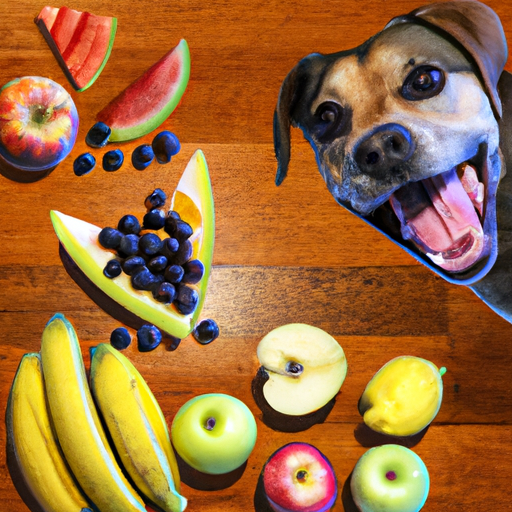Understanding Your Dog’s Dietary Needs
As a loving caregiver, you always want the best for your furry friends. You might think that because fruits are healthy for humans, they should be for dogs as well. However, it’s important to remember that dogs and humans have different dietary needs.
While some fruits can provide health benefits to your dog, others can be harmful. Before sharing a fruity snack with your dog, ensure that it’s safe and beneficial for them.
Fruits That Are Safe for Dogs
Here is a list of fruits that are safe for your canine companion:
- Apples – Rich in fiber and vitamins A and C, apples can be a treat for your dog. However, make sure to remove the seeds and core first as they can be choking hazards.
- Bananas – Known as a good source of potassium and vitamins, bananas can be a sweet treat for your dog. However, due to high sugar content, they should be given in moderation.
- Blueberries – These small fruits are packed with antioxidants, fiber and phytochemicals, which can be beneficial for your dog’s health.
- Oranges – Oranges are safe for dogs to eat, but due to their high sugar content, they should only be an occasional treat.
- Pears – Pears can be a good source of vitamin C and fiber for your dog. However, make sure to remove the pit and seeds.
Fruits You Should Avoid
Just as there are fruits that are beneficial for your dog, there are those you should avoid. Here’s a list of fruits that can be harmful to your dog:
- Grapes and Raisins – These can cause kidney failure in dogs.
- Cherries – Cherry plants contain cyanide which can be harmful to dogs.
- Avocados – The pit, skin, and leaves of avocados contain persin, a toxin that can cause vomiting and diarrhea in dogs.
How to Introduce New Fruits to Your Dog
If you decide to introduce a new fruit to your dog’s diet, do so gradually. Start with small amounts to see how your dog reacts. If they show any signs of discomfort or allergy, discontinue the fruit and consult a vet.
| Steps | Description |
|---|---|
| 1 | Choose a safe fruit |
| 2 | Start with a small amount |
| 3 | Monitor your dog’s reaction |
| 4 | If no adverse reaction, gradually increase the amount |
| 5 | If any discomfort is noticed, discontinue and consult a vet |
Frequently Asked Questions
Q: Can dogs eat fruit everyday?
A: While dogs can eat fruit, it should not replace their regular diet. Fruits should be given as an occasional treat due to their high sugar content.
Q: Is it okay to feed my dog fruit seeds?
A: No. Some fruit seeds like apple seeds can be dangerous for dogs. Always remove seeds before giving fruits to your dog.
Q: Do I need to wash fruits before giving them to my dog?
A: Absolutely. Always wash fruits thoroughly to remove any pesticides or chemicals that might be present.
Remember, when it comes to your dog’s diet, it’s always best to consult with your vet. Your furry friend’s health is a top priority, and understanding what’s safe for them to eat is a big part of that.



